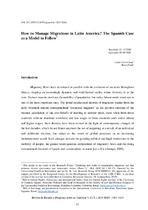Mostrar el registro sencillo del ítem
How to Manage Migrations in Latin America? The Spanish Case as a Model to Follow
| dc.contributor.author | García-Juan, Laura | |
| dc.contributor.author | Güell Torrent, Berta | |
| dc.contributor.other | N/A | |
| dc.coverage.spatial | Seccional Medellín. Escuela de Derecho y Ciencias Políticas | spa |
| dc.date.accessioned | 2019-05-20T13:47:00Z | |
| dc.date.available | 2019-05-20T13:47:00Z | |
| dc.date.issued | 2019 | |
| dc.identifier.issn | 1984-1639 | |
| dc.identifier.uri | http://hdl.handle.net/20.500.11912/4548 | |
| dc.description | 22 páginas | spa |
| dc.description.abstract | Migratory flows have developed in parallel with the evolution of societies throughout history, shaping an increasingly dynamic and multifaceted reality where diversity is at the core. Various reasons motivate the mobility of population, but today labour needs stand out as one of the most important ones. The initial neoclassical theories of migration studies from the early twentieth century conceptualised “economic migrants” as the positive outcome of the rational calculation of the cost-benefit of moving to another place, most often from those countries with an abundant workforce and low wages to those countries with scarce labour and higher wages. Such theories have been revised in the light of contemporary changes of the last decades, which do not frame anymore the act of migrating as a result of an individual and deliberate election, but rather as the result of global processes in an increasing interdependent world. Such changes include the growing political and legal restrictions to the mobility of people, the greater heterogeneous composition of migratory flows and the rising transnational character of spaces and communities, to name just a few (Arango, 2003). | spa |
| dc.format.mimetype | application/pdf | |
| dc.language.iso | eng | |
| dc.relation.ispartof | Revista de Estudos e Pesquisas sobre as Américas y Revista de Derecho, 51 (January/June 2019) | spa |
| dc.rights | Attribution-NonCommercial-NoDerivatives 4.0 International | * |
| dc.rights.uri | http://creativecommons.org/licenses/by-nc-nd/4.0/ | * |
| dc.subject | Migration law | spa |
| dc.subject | International migration flows | spa |
| dc.subject | integration public policies -- Spain | spa |
| dc.title | How to Manage Migrations in Latin America? The Spanish Case as a Model to Follow | spa |
| dc.type | article | spa |
| dc.rights.accessRights | openAccess | spa |
| dc.type.hasVersion | publishedVersion | spa |
| dc.description.sectional | Medellín | spa |
| dc.identifier.instname | instname:Universidad Pontificia Bolivariana | spa |
| dc.identifier.reponame | reponame:Repositorio Institucional de la Universidad Pontificia Bolivariana | spa |
| dc.identifier.repourl | repourl:https://repository.unab.edu.co/ |
Ficheros en el ítem
Este ítem aparece en la(s) siguiente(s) colección(ones)
-
Artículos [48]
Publicaciones en revistas externas a la UPB


